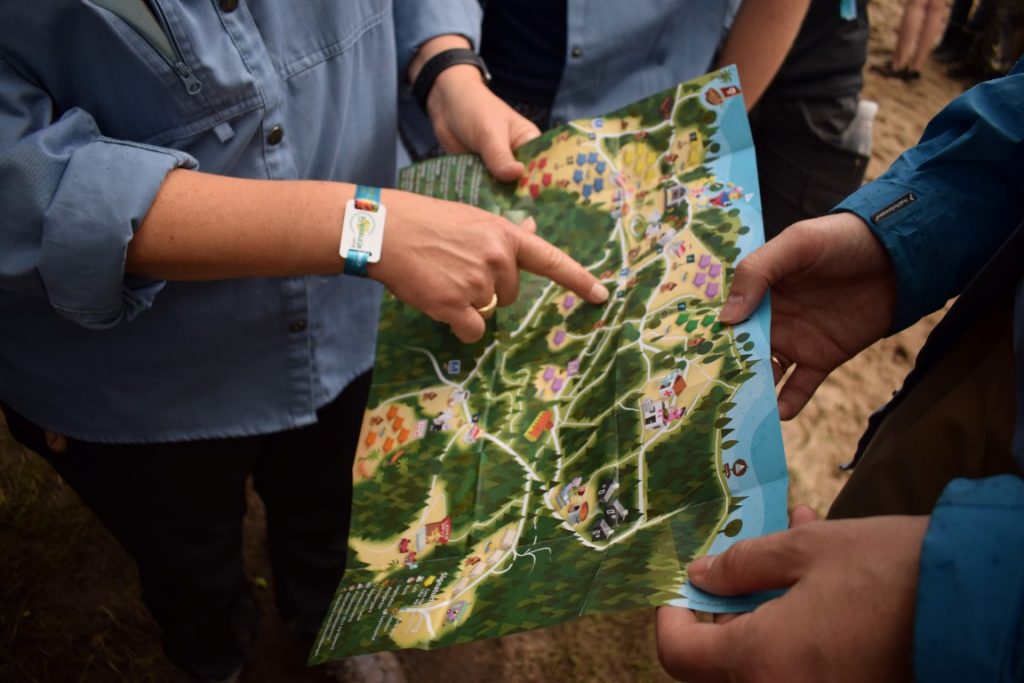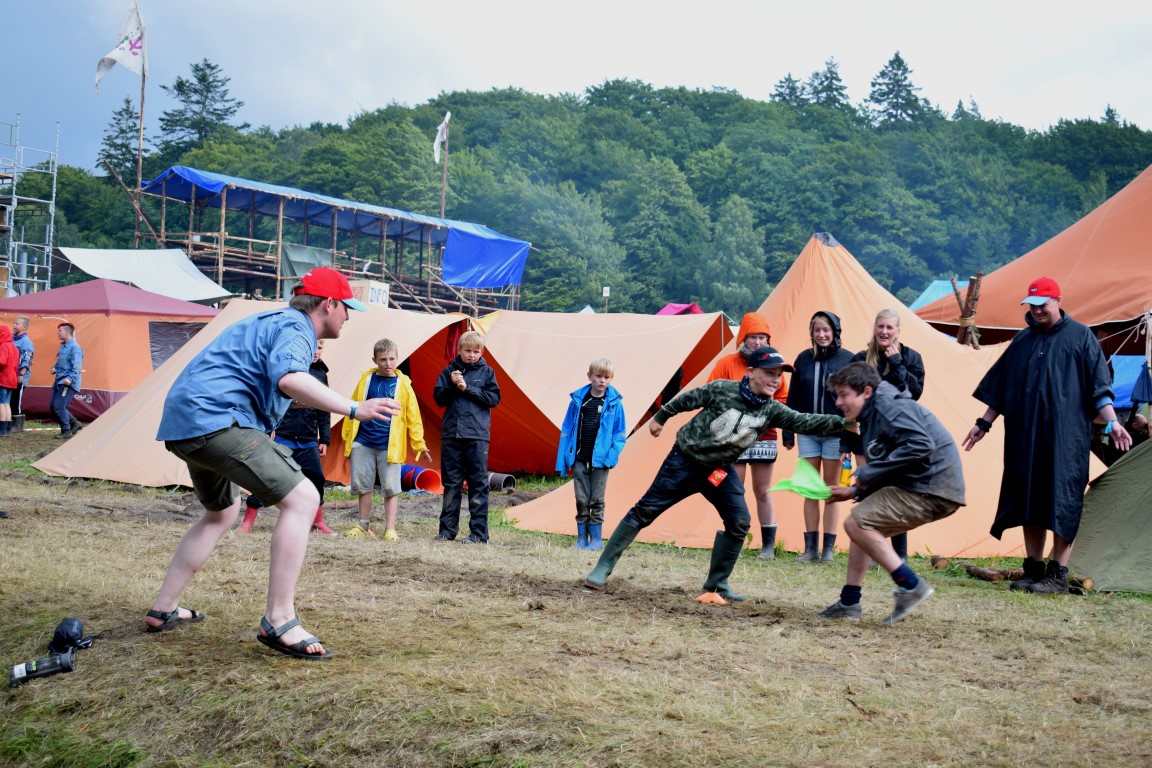[et_pb_section admin_label=”section”][et_pb_row admin_label=”row”][et_pb_column type=”4_4″][et_pb_text admin_label=”Text” background_layout=”light” text_orientation=”left” use_border_color=”off” border_color=”#ffffff” border_style=”solid”]
Let’s begin by watching this interview with Morten Skrubbeltrang and Ane Schjødt Koch from FDF, a Danish scout-like organisation for children and youth in Denmark. The interview was recorded back in July during their national summer camp:
(Sorry about the technical issues – it was my first video with a new camera).
[/et_pb_text][et_pb_text admin_label=”Text” background_layout=”light” text_orientation=”left” use_border_color=”off” border_color=”#ffffff” border_style=”solid”]
 Back when it was summer (Danish rainy summer, that is) I happened to visit a very special place, the FDF National Camp, which takes place every fifth year outside the town of Ry, close to the lake Julsø. The camp is huge with its almost 12.000 participants, who all live in tents, prepare all meals on campfires, and generally do everything outside for the duration of the camp – 9 full days.
Back when it was summer (Danish rainy summer, that is) I happened to visit a very special place, the FDF National Camp, which takes place every fifth year outside the town of Ry, close to the lake Julsø. The camp is huge with its almost 12.000 participants, who all live in tents, prepare all meals on campfires, and generally do everything outside for the duration of the camp – 9 full days.
As if this was not playful enough, they had picked play as the central theme for the entire camp.
“Even if we play just for the sake of playing, something happens with us when we play that would not have happened otherwise. Play is not just for fun – it can be serious too. In play we meet each other in new ways, when we’re building hideouts, creating imaginary worlds or travelling to the moon. In play we are challenged on who we are and who we would like to be. When we play, we see ourselves in a new way, where the differences between us diminish and the sense of community grows” (my translation)
To frame this, they developed a narrative and a fictional kingdom, “Molevitten”, where the Fountain of Play originates (read the story – in Danish). Its energy comes from play itself, and since people are playing less and less, the fountain is drying out. If enough people come to Molevitten to play, the fountain can be saved from extinction.
[/et_pb_text][et_pb_image admin_label=”Image” src=”http://www.counterplay.org/wp-content/uploads/2016/07/DSC_0505_2-Medium.jpg” show_in_lightbox=”off” url_new_window=”off” use_overlay=”off” animation=”left” sticky=”off” align=”left” force_fullwidth=”off” always_center_on_mobile=”on” use_border_color=”off” border_color=”#ffffff” border_style=”solid”] [/et_pb_image][et_pb_text admin_label=”Morten” background_layout=”light” text_orientation=”left” use_border_color=”off” border_color=”#ffffff” border_style=”solid”]
I talked to the general secretary of FDF, Morten Skrubbeltrang, about the camp and the decision to give “play” such a prominent position:
“The theme is “play away” with a strong focus on play – based on the understanding that we all need the haven and space provided by play. We need places, where all we do is play, where we’re simply having fun while playing, and where we experience the community and sense of belonging, that is inherent to play. We also believe that play is being marginalized in some areas, and we would like the camp to be a place, where play has room to live and thrive”
[/et_pb_text][et_pb_image admin_label=”Image” src=”http://www.counterplay.org/wp-content/uploads/2016/10/DSC_0554-Medium.jpg” show_in_lightbox=”off” url_new_window=”off” use_overlay=”off” animation=”left” sticky=”off” align=”left” force_fullwidth=”off” always_center_on_mobile=”on” use_border_color=”off” border_color=”#ffffff” border_style=”solid”] [/et_pb_image][et_pb_text admin_label=”Ane” background_layout=”light” text_orientation=”left” use_border_color=”off” border_color=”#ffffff” border_style=”solid”]
I also had the chance to talk to Ane Schjødt Koch who was responsible for “decoration and installation” at the camp. She coordinated the development of eight “play stations” , encouraging “free play”:
“We made some dogmas for these installations. The play stations should invite people to play freely, they had to be aesthetically pleasing, there could be no rules, no instructors or should be required. Basically, they should just be ready for people to jump right in and play away.”
I heard about the project a while ago, and I was really excited to see the stations in their natural habitat, to learn more about them, and – of course – to try them out. It really shows the dedication of FDF in wanting to create as many meaningful opportunities for people to play.
[/et_pb_text][et_pb_image admin_label=”Image” src=”http://www.counterplay.org/wp-content/uploads/2016/10/DSC_0438-Medium.jpg” show_in_lightbox=”off” url_new_window=”off” use_overlay=”off” animation=”left” sticky=”off” align=”left” force_fullwidth=”off” always_center_on_mobile=”on” use_border_color=”off” border_color=”#ffffff” border_style=”solid”] [/et_pb_image][et_pb_text admin_label=”Text” background_layout=”light” text_orientation=”left” use_border_color=”off” border_color=”#ffffff” border_style=”solid”]
Walking around the camp, I was immediately impressed by the prominence of play. It was everywhere. Everybody was playing, and in so many different ways. You would see people climbing, jumping, running, constructing stuff, but also much more calm, contemplative forms of play took place. There was competition and a whole lot of collaboration. Play in all its diverse glory. This is what we’re always trying to inspire with the festival, since play is such a complex, multi-faceted phenomenon. We can only hope to more comprehensively understand play if we embrace the diversity, so finding so many manifestations at the camp was a pleasant surprise.
Another remarkable thing I noticed, was how everybody played with everybody. In everyday life, many children and young people are mostly interacting with people of their own age group, and play rarely crosses these boundaries. At the camp, this happened all the time, and it didn’t feel forced, but rather like everyone was actually having fun with each other.
This was indeed a playful wonderland, where the usual barriers and reservations had been more or less completely removed, and where people didn’t seem to care much about looking silly, making mistakes, or simply having fun with friends and strangers alike.
I’m sure we can learn a lot about play from FDF, and I’m really curious to explore how we can create similar opportunities to play, also outside the context of a big camp like this.
[/et_pb_text][et_pb_image admin_label=”Birds” src=”http://www.counterplay.org/wp-content/uploads/2016/07/DSC_0471-Medium.jpg” show_in_lightbox=”off” url_new_window=”off” use_overlay=”off” animation=”left” sticky=”off” align=”left” force_fullwidth=”off” always_center_on_mobile=”on” use_border_color=”off” border_color=”#ffffff” border_style=”solid”] [/et_pb_image][/et_pb_column][/et_pb_row][/et_pb_section]

Leave a Reply